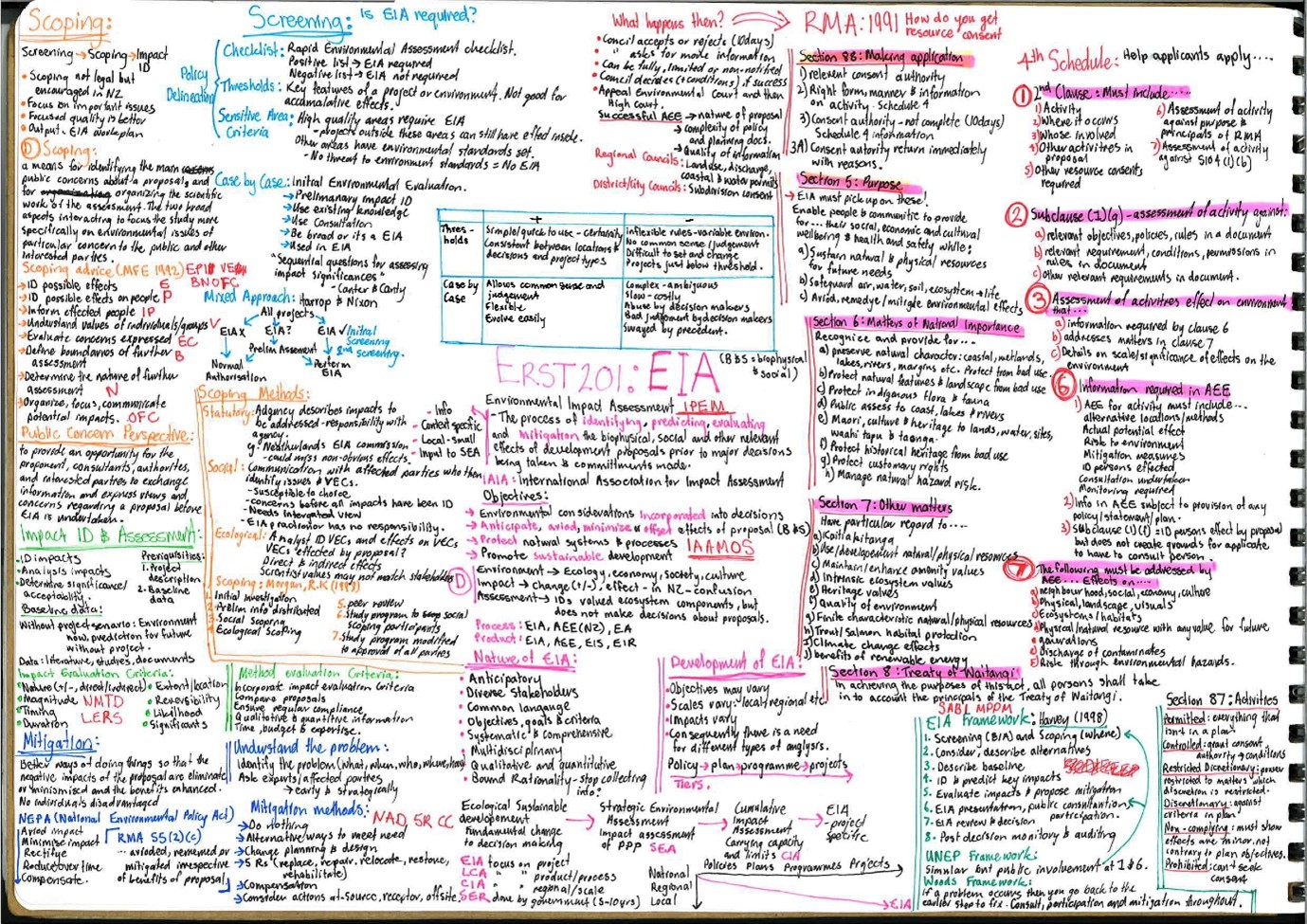Preparing for tests and exams
What steps can you take to best prepare yourself for tests and exams?

The best preparation you can do starts well before you get anywhere near the test or exam itself. There are things you can do during the course, closer to the test or exam and on the day itself.
The work you do on your course is the key to success, so it is the best time to start preparing for exams and tests.
Note the dates for submission of assessments, tests and exams in your calendar as well as a wall planner. Update this if they change. This highlights the dates you are working toward.
Participate in all learning activities (eg lectures, workshops, tutorials, laboratories, studios, field trips) and review all learning material on the Akoraka | Learn course page. Remember, information and hints about the tests/exams are often given throughout the course. Make a note of any hints. If there are any key ideas/concepts/themes you don’t understand, sort those out as they crop up. This will make exam time less pressurised. Ask questions and do further research so you have a good understanding.
Take great notes. Find a note taking style that works for you. Review your notes regularly and add more notes to your notes to guide you when you are rereading, summarising and condensing them maybe months later. Keep them well organised and carefully filed so they are easy to find.
Test/exam structure
Find out:
- the format of the test/exam (online or in-person)
- what course content will be assessed
- the types of questions (eg multiple choice or true/false, short answer, numerical calculations, essay)
Information will be on the Akoraka | Learn course page and it may be discussed in class too. Read any test/exam information carefully. The learning outcomes for the course and for the content being assessed can be a guide to what the examiners will assess.
Past exams
Past exams may be available on Akoraka | Learn and are helpful in guiding your revision and giving you an idea of the types of questions you might expect. If there are no past exams available on Akoraka | Learn ask your Examiner.
Exam timetable
This is released after the mid term break. Exam and assessments information is here. Please note the dates, times and locations for exams can and do change. Please regularly check the timetable, and also keep an eye on your Akoraka | Learn course pages for announcements from your Examiners about exams.
Getting support
Academic Success may run workshops about test/exam preparation. Keep an eye out for these on this website and make time to attend.
Go through your notes
Check things you still aren’t sure of. You need to get your head around all concepts/theories presented. You can’t answer questions well if you don’t fully understand what you are talking about. Start with the key ideas and narrow it down to specific information, facts and how to apply the key ideas. Summarise your notes and review these regularly.
Create a study schedule
Set realistic goals for study sessions and prioritise. Think about the proportion of course marks the test/exam is worth (see your course outline). Spend more study time on an exam worth 50% of your final grade than one worth 25%. Consider how much material you have to learn and your various course strengths and weaknesses as you allocate time.
When you are actually studying, chunk your study into manageable blocks with short breaks in between to stretch, get some fresh air or a quick coffee or snack. Your mind needs breaks too.
Review what you have learnt
At the end of each study session review what you have just done by noting down key points, making a mindmap or cue cards, or recording yourself discussing the main takeaways from the session in your phone. This will help consolidate what you have just reviewed.
Re-frame to help you remember
Condense and/or repackage your notes over and over again. This will help to consolidate your knowledge of the work being tested. Use a variety of ways to do this. LU student Alice Watson has reprocessed and condensed one of the topics of a course into a summary mindmap below. You can see the key concept in the middle with the main headings around it in orange with detail below these. The pictures aid memory and recall. Key readings are noted for use as supporting evidence in the exam.

LU student Jodanne Aitken summarised a whole semester of work. There are multiple topics on a final summary one pager below. Topics are colour coded, information is laid out in related chunks of information, and Jodanne has used questions to reinforce the underlying concepts, noted key readings and used arrows to show connections and processes.

The above examples are the end result of the process of refining down huge amounts of information into one page as part of the test and exam preparation process.
Online test/exam
Well before test/exam day, make sure that your internet connectivity and the necessary technology are good to go. Then prepare a quiet, calm space to do the test/exam in if you are doing it off campus. Make sure you know what the technical requirements for the test/exam are and what, if any, online invigilation you need to be connected to and how to connect. Read the helpful information on Akoraka | Learn about the technology requirements around exams.
Don’t freak out
It’s a tense time but you know what you need to do to keep healthy. Eat well, get plenty of sleep and some fresh air and exercise to keep balance in your life. Stay in touch with your university friends to support each other through this intense time.
The night before
Double check the location and start time, and instructions around exam conditions and connectivity. Have a good meal. Go over your summarised notes etc. but not too much. Put your laptop on the charger and go to bed early with an alarm set.
On the day
Have a really quick look over your summarised notes on the morning of the test/exam to refresh your memory. Don’t try to learn anything new though.
Set up your space or get to campus nice and early with everything you need to connect and complete the test/exam according to the instructions, following all invigilation guidelines, so you are comfortable and calm.
It’s usual to feel a bit nervous but if your anxiety is increasing take some deep calming breaths through your nose: 5-7 seconds in, hold for a beat, and then 7-11 seconds out. Repeat three times.
In the exam
Have a look over the whole exam, read all the instructions and make a quick plan of what questions to do first, and how much time you’ll spend on each section/question allocating more time for more marks. Keep an eye on the time and stick to your plan for time. If you run out of time for a question, move on to the next one and come back later.
Read all questions carefully and answer them as they are asked not as you were hoping for. Don’t write everything you know about the topic.
Finish all questions, even if it’s only notes at the end.
Try to allow time near the end to check over your exam. Make sure you have answered all questions and proofread your answers.
-
Multiple choice questions can be tricky. Try and answer multiple-choice questions before you look at the answer options then read all the alternatives carefully and choose the most suitable. Look out for words such as all, none, never, always, only, not. Don’t spend any more than the allotted time on each question and answer them all as you are not marked down for a wrong answer.
-
Short answer questions require you to both remember and apply knowledge. Answer them directly, writing clearly and concisely. Read the instruction words in the question carefully and think about key terms you might need to define and use, and the supporting evidence you’ll use.
-
Numerical questions require you to present your answer to a calculation. Show the formula or approach you used and all your workings. Remember to write your answer in context, not just what shows on your calculator (ie $10.00 per day instead of 10).
-
Scenario/case questions require you to read and consider a scenario as you apply your knowledge to answer the questions. Read the scenario carefully and make clear connections between the underlying theory it relates to and the scenario in your answers.
-
Essay questions require you to analyse the question, noting its topic and task words; make a quick plan and note any important key words/ideas you want to include. Remember you’ll likely need an introduction, body paragraphs and a conclusion.
Get Individual Advice
Talk to Academic Success or attend one of our workshops for help with your study.


